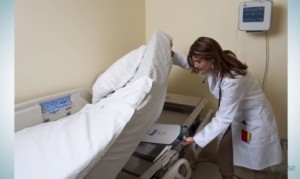 Waltham, Massachusetts-based EarlySense, which makes a passive and contactless bedside monitor that continuously measures respiration rate, heart rate and motion, has received a new FDA clearance for a sensor designed to work with not a bed, but a chair.
Waltham, Massachusetts-based EarlySense, which makes a passive and contactless bedside monitor that continuously measures respiration rate, heart rate and motion, has received a new FDA clearance for a sensor designed to work with not a bed, but a chair.
"Medical institutions have often expressed the need for automatic sensing in chairs," Avner Halperin, CEO of EarlySense, said in a statement. "Hospitals have used the EarlySense bed sensor solution to make their beds a smart, safe place for more than 100,000 patients. Hospitals have shown us that they value smart beds, now for the first time they can get 'smart chairs'. In addition, with a chair sensor we believe that a number of other clinical environments will open up to the EarlySense System, such as emergency departments, outpatient clinics and waiting areas where concern around patients may exist and today there is no practical way to monitor patients."
According to the company, as patients recover from their conditions and their mobility increases, doctors often like them to move from beds to chairs. A move to an upright position can speed recovery, improve lung function and reduce potential pulmonary complications. The chair sensor is essentially the same technology as the EarlySense mattress sensor, but embedded in a chair. An early warning system can alert hospital staff if a fall is imminent.
"The EarlySense System is allowing the medical staff to recognize potential adverse events prior to them becoming acute events that potentially put patients in jeopardy," SueLane Hughes, Director of the Medical/OPO Unit at Coffee Regional Medical Center, where the sensor was tested, said in a statement. "The chair sensor is another tool to assist us in preventing patient falls by getting staff into patients' rooms before they have exited the chair. Since we started using the chair sensor we have had zero patient falls from chairs."
EarlySense, which is a US subsidiary of Israel-based EarlySense International, was founded in 2004 and has received $46 million in funding, including $15 million last November. The company received FDA 510(k) clearance for its original bed sensor in 2010, but the current generation of the device was cleared in January of this year. Among the changes to the system were more sophisticated management tools to help administrators better measure and track quality goals.
The company began selling their sensors for the home, but pivoted to the hospital market, beginning in ICUs and emergency rooms and moving to other parts of the hospital. In January, Halperin told MobiHealthNews the company has designs on getting back into the home.

















